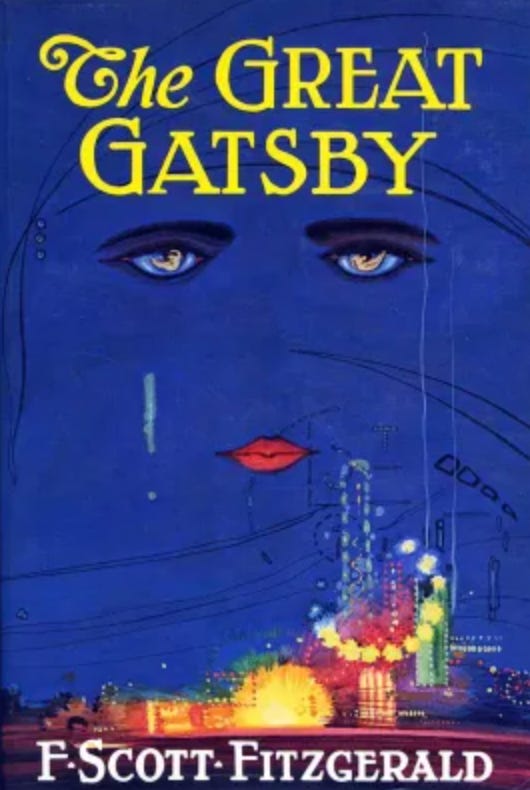Breezy With Low Humidity: It's Your Memorial Day Weekend Wag!
We Bring You a Holiday Weekend Starring Meghann Fahy, Julianne Moore, Nicole Kidman, Pee-wee Herman, Stereolab & More…
And so with the sunshine and the great bursts of leaves growing on the trees—just as things grow in fast movies—I had that familiar conviction that life was beginning over again with the summer.
Dear Wags,
The Great Gatsby turned 100 back on April 10, as you may have seen in one fluff piece or another. We think of it as we head into Memorial Day Weekend because of the quote from the novel above—and because no matter how we try to reform ourselves, it says so much about American avarice, longing, and heedlessness that it reads like a definitive judgment. We are a people who yammer on about fair play in a culture that tilts as often toward unfairness as it does toward that promised justice. And because we are the most narcissistic and forgetful of societies—simultaneously innately cynical and dangerously naïve—we still frame every tragedy as a loss of innocence, as if we haven’t been exactly where we are many times before.
That is our irritating national talent: Americans are trapped in an endless loop of cultural shame and reinvention. What we are living through now, which seems bleakly unfamiliar, will give way to something else before you know it. We’ll give ourselves over to summing up a tumultuous clutch of years as an “era” well before it’s even over—and somehow miss the bigger patterns: the deep similarities between one ugly moment and so many others, the things that make a supposedly unprecedented crisis part of a long and quite ordinary thread. For all our power, it puts us at a disadvantage in a world that clings to older memories and longer grudges.
When we look at what we fight so viciously about now—immigration, economic policy, education, individual rights, crime, our role in the world, media, the way we work, what it means to be a democracy—we often frame these dilemmas as if they sprang up sui generis, on Tuesday. If some of us nod to our tortured history—or, as they are called in certain beleaguered circles, structures of oppression—we aren’t being very serious. We don’t have the patience to look back at the ordeal of history in all its complexity and learn from it—not to blame our opponents, but to fold its lessons into our shared experience, to accept that we are, all of us, both entirely innocent and implicated in what came before. None of us can look back without attempting to score points against our present-day enemies—which may just prevent us from learning anything at all.
Lately, when we reach into that contested past for precedent, the same examples keep being thrown up—the Gilded Age, the ominous preludes to World War I or World War II, the upheaval of the 1960s, and the backlash that followed. It’s useful to remember how compressed the American framing is. President McKinley, whom an admiring President Trump seems to have just discovered, was assassinated 124 years ago, in 1901. Our Civil War, so ominously hinted at these days, ended 160 years ago last month. There are still around 66,000 Americans who fought in the last world war, and many more who at least dimly remember it. There are more than six million living veterans of Vietnam, and over two million veterans of the wars in Afghanistan and Iraq. Of more than four million Black Americans over 65, a significant number experienced de jure segregation. We are not talking about some ancient and buried history, but a history that is being lived and litigated—every day.
Somehow, American amnesia exists alongside a traumatic legacy. Just five years ago, this country was ravaged by the COVID-19 pandemic, which derailed familiar societal patterns and claimed more than a million lives—the most of any country, and the 17th highest per capita globally. In the grim accounting, it stands as the deadliest disaster in our history. Yet it is rarely spoken of as an unparalleled tragedy, a moment of universal hardship and mourning. Instead, it has become just another opportunity for divisive argument; we rushed past grief, straight into grievance. Given what we’ve just been through, it’s a wonder things aren’t even crazier.
So maybe, this Memorial Day, we can spare a moment for all the people we’ve lost, in ways that seem so arbitrary and wrong. We might strain to see even our enemies as compatriots who bear similar wounds—and spare them a little grace. Whatever they believe, they have suffered too.
No matter what we tell ourselves, we cannot live outside history. Still, summer always returns, the trees burst with new growth, and even the hardest heart quickens with possibility. Far more than in Fitzgerald’s day, American life is a fast movie, and its heartbreaks can become a deadening blur. But what makes us a maddening and endearing people is our refusal to abandon the promise of another summer—a peculiar New World faith that we may always begin again.
Yours Ever,
We Know What They Did Last Summer
Sirens (Netflix). Meghann Fahy has a great travel agent: she spent Season 2 of The White Lotus in Taormina, then shipped off to Nantucket for the pedestrian murder mystery The Perfect Couple. Now Fahy’s back on a New England resort island for another class war black comedy-thriller—this one smarter than the last. This time, she’s Devon, a hard-luck case from Buffalo who washes into port to reunite with her kid sister Simone (Milly Alcock), now the Lilly Pulitzer–wearing handmaiden of Kiki (Julianne Moore), a lean-in one-percenter and environmental guru whose icy empowerment talk reveals—quicker than you can catch Lyme disease—that the rich aren’t like us, they’re controlling creeps. What is it with these people wanting to share a bed with their assistants? Meanwhile, her hedge fund mogul husband (Kevin Bacon) broods in the den.
Molly Smith Metzler adapts her 2011 play Elemeno Pea with wit; this getaway of pastel loungewear and shingle-style mansions is a dystopian nightmare straight out of Architectural Digest. The message is that money can be a dangerous cult, but it’s almost impossible to resist.
— Marge Sherwood
Keep reading with a 7-day free trial
Subscribe to CultureWag to keep reading this post and get 7 days of free access to the full post archives.






